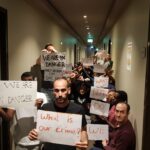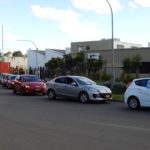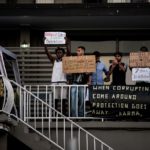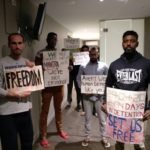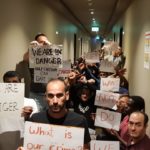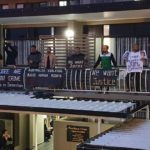End Immigration Detention Violence: An Interview With Refugee Activist Emma Comley
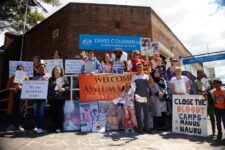
Recently, footage came to light that depicts five Villawood Detention Centre guards on top of a detainee, forcefully wrestling him on the ground. And while another detainee films the March incident, a staff member orders him to stop, as he “doesn’t have permission to film Serco staff”.
Since this footage emerged, refugee rights activist Emma Comley has raised concerns over an incident at the Brisbane Immigration Transit Accommodation (BITA) Centre that involved three Serco guards applying excessive force in wrestling a detainee to the ground.
And this is certainly not the first time violence in Australian immigration detention has been raised. Last year’s Australian Human Rights Commission report into the use of force in detention found that in nine of fourteen incidents investigated, the human rights of detainees had been violated.
While in regard to Peter Dutton’s plans to pass laws to enable the confiscation of detainees’ phones, National Justice Project director George Newhouse said in May that these devices were essential in helping to moderate the “violence and bullying” of guards.
Rallying against injustice
Emma Comley is a member of We Are Better Than This: a refugee rights activist group that’s been staging weekly protests out the front of Australian immigration minister David Coleman’s office, calling for an end to the inhumane treatment of people who arrived in this country by boat.
Sydney Criminal Lawyers spoke to Ms Comley about the excessive force incident a friend of hers was subjected to at BITA, the fact that these types of actions on the part of guards are an ongoing issue, and how it’s about time the government did something to protect detainees during the pandemic.
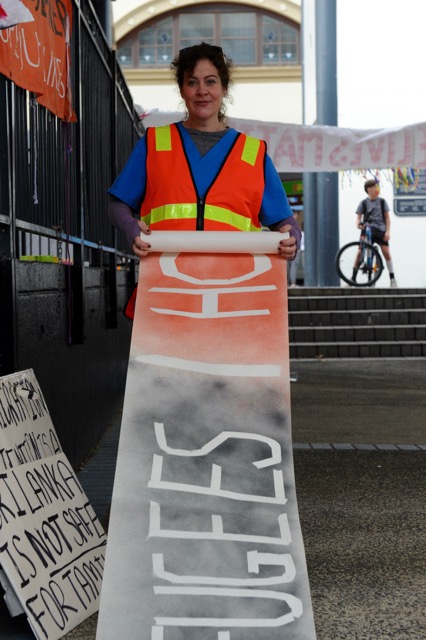
Firstly, you recently raised concerns over an incident that took place at BITA, which involved a detainee being set upon by three Serco guards in January. Emma, what actually happened? And what were the repercussions?
The incident happened on 2 January to a friend of mine, who goes by the name of “Ned Kelly”.
It occurred because they wanted to send him to hospital, despite the fact that it wasn’t necessary. Serco were insisting on this. And they wanted to call an ambulance. But he was showing no symptoms and was fine.
In order for the medical transfer to proceed they would need to perform a pat down search, which is typical before any transfer.
Now, prior to any pat down search it’s the entitlement of the person being searched to have the relevant section of the Migration Act read out to them, because it stipulates the conditions of the search.
So, when Ned asked for this to be done, Serco refused. The shift manager, then jumped on Ned and started punching and slapping him about the head and shoulders.
Then two other guards immediately jumped in and started doing the same, until they wrestled him to the floor.
They broke his property, including headphones, clothing and a bum bag. The hospital transfer continued. But no treatment was given to Ned, because he had no symptoms. And he was later discharged.
He managed to record most of the incident using his mobile phone, until the point where he was on the floor and needed to defend himself.
The police didn’t attend to the incident on the first night. It took three months of nagging them to actually arrange a signed statement from Ned.
Serco claims that the CCTV footage was unavailable because it was out of order at the time. Yet, the ABF say they have reviewed the footage.
Following the investigation, there were no charges laid. ABF wrote a letter to Ned explaining that Serco had not breached their procedures and that he was detained using this force for his own safety, even though he was posing no risk to himself or anybody else.
He was not under the schedule of the Mental Health Act at the time, so how was throwing him on the floor, in a relatively unprovoked attack, when he is already traumatised, supposed to be in his best interest?
The ABF have a primary duty of care, under section 19(2) of the Work Health and Safety Act, which states “a person conducting a business or undertaking must ensure, so far as is reasonably practicable, that the health and safety of other persons is not put at risk from work carried out as part of the conduct of the business or undertaking”.
Now, that includes every single detainee who is held in immigration detention facilities. And it is clear that maybe the police don’t even know that. Particularly in the case I have highlighted.
So, there is absolute impunity for the perpetrators in this case. And it’s also important to highlight that this kind of event is not at all unusual.
As you maintain, this is no isolated matter. In your understanding, what is happening within Australian immigration detention, when it comes to the use of force by those in charge?
We can see from witness accounts that there’s frequent use of arbitrary violence in this country’s detention system. This also includes people being held offshore.
But from the footage we’ve been seeing that’s coming straight from those in detention, this is what’s happening on a regular basis with impunity.
Now, some centres are more renowned for this than others. Largely, it all depends on individuals. There are some that are more notorious than others.
Often perpetrators will stick together and protect each other. It’s been explained that if certain individuals are together on duty, then you can anticipate that there will be problems.
It’s also fair to point out that it’s not all guards. There are a small number who seem to be better.
But then there are frequent examples of detainees being jumped on for wanting to take a drink outside in the yard, for example.
The guards there need to be employing strategies that maximise everybody’s safety and deescalate any conflicts.
But we can see the excessive use of force by several guards at once, high numbers of emergency response and restraint incidents, long periods in isolation for no reason, broken bones, property theft, taunts and intimidation, and sneering and laughing at those who lost hope long ago.
The list goes on. There are trivial rules being made up on the spot. Rumours of body searches in the middle of the night, and guards whose hands wander every time they search somebody.
Refugees have already fled terror. They are already traumatised. Over the years, there has been no transparency into the treatment of immigration detainees. Nobody has been watching. Nobody has been allowed to speak up.
The government has systematically lied in an attempt to stop the public from realising what’s been happening. People have died at the hands of those who are being paid a fair wage to care for them.
Refugees deserve refuge, not detention. And it’s extremely obvious that this very reason is at the core of Peter Dutton now wanting to take their phones away from them.
They must keep their phones for their own safety – to record and diarise all of these breaches of rights – so that one day they may be used as evidence in court.
How would we have known the government was trying to force Priya and Nades and their two Australian-born daughters onto a plane to send them back to certain harm in Sri Lanka, had they not had access to their phones on that night at the airport?
It’s too late for many. And it has gone on for years too long. People deserve to know what their hard-earned tax dollars are being spent on.
You took part in a late May car convoy protest out the front of Sydney’s Villawood Immigration Detention Centre.
It was calling on NSW authorities to do something about the lack of attention they’ve given to those being detained in these centres during the COVID pandemic.
Now, it’s come to light that 30 Villawood Immigration Detention Centre guards have been stood down this week, as they attended a party at the Casula Crossroads Hotel, which is where the recent virus cases have been linked to.
What does this tell us about the way the authorities have acted during the pandemic in regard to detainees?
As I understand it, a large group of guards from Villawood went to a hotel at Casula for a party, where there was a known positive case and then an unknown number of guards went straight back into work.
They have broken the government’s social distancing rules and put each and every detainee that they’ve come into contact with at risk.
Now, this is a perfect demonstration of the way our friends in immigration detention are at risk in their right now.
I was at a protest this morning, where a police officer told our group we would be in trouble if we did not practice social distancing. So, why is it different rules for Serco staff?
The government has ignored the rights of all detainees in immigration detention. They have done this for years, of course, but now it’s much more urgent due to the pandemic.
Their refusal to show compassion has created COVID hotspots in our own backyard, where refugees are sitting ducks waiting for transmission of the coronavirus.
Guards are coming and going freely, as we’ve known all along. They go home to their families and then to the store and to work. This is a potential public health disaster waiting to happen.
The detainees inside these centres are already compromised in terms of their immunity, especially after having been detained for up to a decade in some cases. Many are now in their seventh year. And they’re already sick.
Why aren’t they entitled to the same public health precautions that are being imposed on the rest of our country right now. The hypocrisy is ludicrous and it’s unnecessary.
Meanwhile, down in Melbourne, one of the staff members at the Mantra Hotel – where about 60 former offshore asylum-seeking detainees are being held – has tested positive for COVID-19.
Emma, what do you think the government should be doing with these people right now as the pandemic is on the rise again?
They have to let them go. They need their freedom. They needed this before the pandemic but especially now.
They deserve the chance to survive this pandemic, like we all do. We all have a responsibility towards each other, as well as ourselves. We must do everything we can to stop the spread of this virus.
Each state owes it to the other. Each suburb owes it to the next. Each country to its neighbours. I owe it to my next-door neighbour. That’s the way it works.
And the government owes protection against the spread of coronavirus to every single detainee, as well as every single Serco employee, ABF officer, and every housekeeping staff member.
There are thousands of people in the community who have been waiting for many years to share our homes with these people. There are people who have signed petitions and written letters begging to be able to.
There are wives waiting for their husbands and children waiting for their fathers to be released. It doesn’t have to be this way.
Why does the government insist on wasting all this money to separate families and destroy so many lives, when there are cheaper, safer and more humane alternatives? It’s an absolute shame on this country.
And lastly, as part of We Are Better Than This, you attended a protest out the front of prime minister Scott Morrison’s office in Cronulla last Friday.
This was after the group had been protesting out the front of immigration minister David Coleman’s Revesby office for the 37 weeks prior to that.
How have these actions been going? And what are you calling on these government ministers to do in regard to immigration detainees in the long-term?
Mr Coleman has been stood down for the last few months. Nobody really knows why. And the current acting immigration minister was interviewed yesterday and lied blatantly about the detainees who came here as part of Medevac.
But while David Coleman hasn’t resigned, we will continue to protest at his office. They don’t accept our messages to him anymore. They don’t allow us to enter the office. They’ve said we’ve been threatening and will no longer allow us entry.
It’s now been 38 weeks that we have been asking for five minutes of the immigration minister’s time. We realise that it’s pretty unlikely at this stage.
But, right now, while he’s still being paid as minister of immigration, he still has ministerial power to intervene on behalf of refugees and asylum seekers in detention.
We have no plans to stop fighting for justice for refugees. We are calling for an end to all indefinite detention. That’s everywhere, offshore and onshore.
And we want permanent protection – financially and otherwise – as well as timely processing for the thousands of asylum seekers and refugees in our community.


